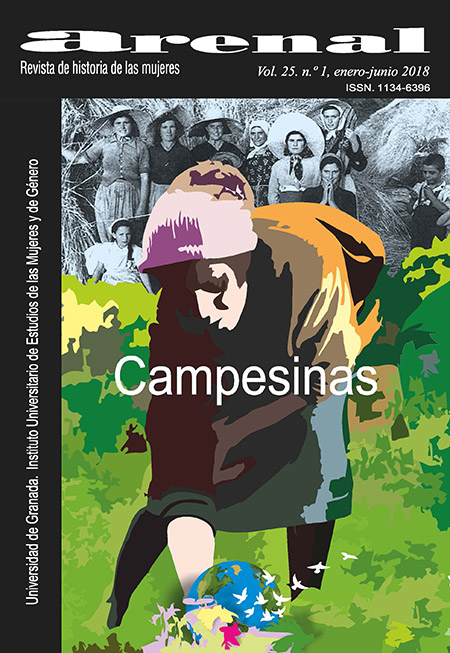Con amor pero con rabia: Género e intimidad en una publicación del comunismo italiano de los 60
DOI :
https://doi.org/10.30827/arenal.v25i1.4715Mots-clés :
Comunismo en Italia, Género y Sexualidad, Historia de las Mujeres en Italia, EmocionesRésumé
El artículo se centra en los escritos de la novelista y cineasta Lorenza Mazzetti en un semanariodel Partido Comunista Italiano durante la década de 1960. A través de sus artículos, Mazzetti criticabaconcepciones tradicionales y católicas de género y feminidad, así como también las conciliacionespor parte de los comunistas con nociones tradicionales de la familia. De la misma manera, Mazzettidesplegó una reflexión profunda acerca de la implicancia social de la vida afectiva. Mazzetti animóa sus lectores/as a evitar incurrir en relaciones dependientes y sumisas, o en el conformismo conuna sociedad cada vez más superficial. El artículo sugiere que la experiencia de Mazzetti se puedeconsiderar como representativa de las transformaciones culturales que atravesaban la Italia de los60, y sobre todo de las expectativas y temores en torno a la conformación de una moderna sociedadde consumo.
Téléchargements
Références
ADLER HELLMAN, Judith (1987): Journeys Among Women. Feminism in Five Italian Cities. Nueva York, Oxford University Press.
AHMED, Sara (2004): The Cultural Politics of Emotions. Nueva York, Routledge.
ASCOLI, Giulietta (1976): “L’UDI tra emancipazione e liberazione”. Problemi del socialismo, 17, 4, 109-159.
BELLASSAI, Sandro (2010): La Morale Comunista. Pubblico e Privato nella rappresentazione del PCI, 1947-1956. Roma, Carocci.
CALDWELL, Lesley (1991): Italian Family Matters: Women, Politics and Legal Reform. Londres, Macmillan. DOI: https://doi.org/10.1007/978-1-349-21525-6
CAMPBEL, Sue (1994): “Being Dismissed: The Politics of Emotional Expression”. Hypatia, 9 DOI: https://doi.org/10.1111/j.1527-2001.1994.tb00449.x
CASALINI, Maria (2013): “The family, sexual morality and gender identity in the communist tradition in Italy (1921-1956)”. Modern Italy, 18:3, 229-244. DOI: https://doi.org/10.1080/13532944.2013.812377
BETTI, Giuseppe (2002): L’italiana che invent˜ il Free Cinema inglese. Vita cinematografica di Lorenza Mazzetti. Piacenza, Vicolo di Pavone.
CRAINZ, Guido (2005): Storia del miracolo italiano. Cultura, identitˆ, trasformazioni fra anni cinquanta e sessanta. Roma, Donzelli.
DAVID, Michel (1990): La psicanalisi nella cultura italiana. Turin, Bollati Boringhieri.
DE CLEMENTI, Andreina (2002): “The feminist movement in Italy”. En R. Braidotti & G. Griffin (eds.), Thinking differently: A reader in European women’s studies. New York, Zed Books.
DE GRAZIA, Victoria (2005): Irresistible Empire: America’s Advance Through 20th-Century Europe. Cambridge, Harvard University Press. DOI: https://doi.org/10.4159/9780674031180
ECO, Umberto (1984): Apocal’pticos e Integrados. Barcelona, Editorial Lumen.
ERGAS, Yasmine (1982): “Feminism and the Italian party system: Women’s Politics in a Decade of Turmoil”. Comparative Politics, 14, 3, 253-279. DOI: https://doi.org/10.2307/421954
FEIXA, Carles (2008): “M‡s all‡ de Eboli: Gramsci, De Martino y el Debate Sobre la Cultura Subalterna en Italia”. En Carles Feixa, El Folklore Progresivo y Otros Ensayos. Barcelona, MACBA/ UAB-Universitat Aut˜noma de Barcelona.
FOOT, John M. (1999): “Mass Culture, Popular Culture, and the Working Class in Milan, 1950- 1970”. Social History, 24, 2, 134-157. DOI: https://doi.org/10.1080/03071029908568059
FOUCAULT, Michel (1977): Historia de la Sexualidad: Vol. 1: La Voluntad de Saber. Buenos Aires, Siglo XXI.
FRYE, Marilyn (1983): “A Note on Anger”. En Marylin Frye, The Politics of Reality. Essays in Feminist Theory. Trumansburg, NY, Crossing Press.
GIDDENS, Anthony (1992): The Transformation of Intimacy. Sexuality, Love and Eroticism in Modern Societies. Stanford, CA: Stanford University Press.
GINSBORG, Paul (2003): A History of Contemporary Italy. Society and Politics 1943-1988. New York, Palgrave.
GOODWIN, Jeff, Jasper, James, y Polletta, Francesca (eds.) (2001): Passionate Politics. Emotions and Social Movements. Chicago y Londres, University of Chicago Press. DOI: https://doi.org/10.7208/chicago/9780226304007.001.0001
GUNDLE, Stephen (1986): “L’americanizzazione del quotidiano. Televisione e consumismo nell’Italia degli anni cinquanta”. Quaderni Storici, 62, a–o 21, 2 (agosto) 561-594.
— (1991): “Cultura di massa e modernizazzione. Vie Nuove e Famiglia Cristiana della guerra fredda alla societa dei consumi”. En Pier Paolo D’Attore (ed.), Nemici per la pelle. Sogno americano e mito sovietico nell’Italia contemporanea. Milano, F Angelli.
— (1999): “Femminine Beauty, National Identity and Political Conflict in Postwar Italy, 1945-1954”. Contemporary European History. 8 (3).
— (2000): Between Hollywood and Moscow. The Italian Communists and the Challenge of Mass Culture, 1943-1991. Durham y Londres, Duke University Press.
HOBSBAWM, Eric (1995): Historia del Siglo XX, 1914-1991. Barcelona: Cr’tica.
ILLOUZ, Eva (1997): Consuming the Romantic Utopia: Love and the Cultural Contradictions of Capitalism. Berkeley, University of California Press. DOI: https://doi.org/10.1525/9780520917996
— (2012): Por quŽ duele el amor: Una explicaci—n sociol—gica. Madrid, Katz editores.
JUDT, Tony (2005): Postwar: A History of Europe since 1945. Nueva York, The Penguin Press.
KURZWEIL, Edith (1973): “Reflexions on Contemporary Italian Sociology”. Contemporary Sociology, Vol. 2, n. 3 (mayo) 247-254. DOI: https://doi.org/10.2307/2064167
LIGUORI, Maria Chiara (2003): “La paritˆ si acquista ai grandi magazini? Boom economico e trasformazione del modelo femminile”. En Paolo Capuzzo, Federico Romero, Elisabetta Vezzosi, Genere, Generazione e Consumi: L’Italia degli Anni Sessanta. Roma, Carocci.
LILLI, L (1976): “La stampa femminile”. En Valerio Castronovo y Nicola Tranfaglia (eds.), Storia della Stampa Italiana, Vol. 6 La stampa del neocapitalismo. Bari, Laterza, 253-311.
LUMLEY, Robert (1990): States of Emergency: Cultures of Revolt in Italy from 1968 to 1978. New York/London, Verso.
LUSSANA, Fiamma (1997): “Le donne e la modernizzazione: il neofemminismo degli anni settanta”. En Francesco Barbagalle (coord.), Storia dell’Italia repubblicana. Vol. 3, 2. Tur’n, Einaudi.
MAZOWER, Mark (1998): Dark Continent: Europe’s Twentieth-Century. Nueva York. Vintage Books.
MAZZETTI, Lorenza (1961): Il Cielo Cade. Roma. Garzanti.
— (1963): Con Rabbia. Roma. Garzanti.
— (1969): Il lato oscuro. Roma. T’ndalo.
MECACCI, Luciano (1998): Psicologia e psicoanalisi nella cultura italiana del Novecento. Bari, Laterza.
MEDINA DOMƒNECH (2012): “Sentir la Historia. Propuestas para una Agenda de Investigaci—n Feminista en la Historia de las Emociones”. Arenal 19:1 (enero-junio) 161-199. DOI: https://doi.org/10.30827/arenal.v19i1.1412
MILES, Barry (2010): London Calling: A Countercultural History of London since 1945. Londres, Atlantic Books.
MORRIS, Penny (2004): “From Private to Public: Alba de Cespedes’ Agony Column in 1950s Italy”. Modern Italy, 9, 1 (mayo). DOI: https://doi.org/10.1080/13532940410001677467
— (2006): “The Harem Exposed: Gabriella Parca’s Le italiane si confessano”. En Penny Morris, Women in Italy, 1945-1960: An Interdisciplinary Study. New York, Palgrave.
— (2007): “A Window on the Private Sphere: Advice Columns, Marriage, and the Evolving Family in 1950s Italy”. The Italianist (27) 304-332. DOI: https://doi.org/10.1179/026143407X234194
PARCA, Gabriella (1964): Le italiane si confessano. Milan: Feltrinelli. [1959]
PASSERINI, Luisa (1991): “Il movimento delle donne”. En Nicola Tranfaglia et al. (eds.), La cultura e i luoghi del ’68. Milan, Franco Angeli.
PICCONE STELLA, Simonetta (1993): La Prima Generazione: ragazze e ragazzi nel miracolo economico italiano. Milan, Franco Angeli.
PINTO, Diana (1981): “Sociology, Politics, and Society in Post-war Italy, 1950-1980”. Theory and Society, Vol. 10, n. 5 (septiembre) 670-693. DOI: https://doi.org/10.1007/BF00240397
REDDY, William (2001): The Navigation of Feeling: A Framework for the History of Emotions. Cambridge, Cambridge University Press. DOI: https://doi.org/10.1017/CBO9780511512001
ROSSI-DORIA, Anna (1994): “Le donne sulla scena politica”. En Storia dell’Italia repubblicana. Vol I. La costruzione della democrazia. Dalla caduta del fascismo agli anni cinquenta. Tur’n, Einaudi, 779-846.
ROSENWEIN, Barbara (2002): “Worrying About Emotions in History”. The American Historical Review, 107, 821-845. DOI: https://doi.org/10.1086/532498
ROTHENBERG, Nina (2006): “The Catholic and the Communist Women’s Press in Post-War Italy- An Analysis of Cronache and Noi Donne”. Modern Italy, 11:3, 285-304. DOI: https://doi.org/10.1080/13532940600937053
RUSSEL HOCHSCHILD, Arlie (1983): The Managed Heart: Commercialization of Human Feeling. Berkeley, University of California Press.
SARACENO, Chiara (1979): “Trent’anni di storia della famiglia italiana”. Studi Storici, 20, 4 (oct.- dic.) 833-856.
— (2004); “The Italian Family From the 1960s to the Present”. Modern Italy, 9, 1 (mayo) 47-57. DOI: https://doi.org/10.1080/13532940410001677494
SCARPELLINI, Emanuela (2003), “People of Plenty: Consumi e Consumismo come Fattori d’Identita nella Societa Italiana”. En Capuzzo, Romero, Vezzosi, Genere, Generazione e Consumi. Roma, Carocci
SEYMOUR, Mark (2006): Debating Divorce in Italy: Marriage and the Making of Modern Italians, 1860-1974. NY, Palgrave Macmillan. DOI: https://doi.org/10.1057/9780230601741
— (2010): “Steel Capsules and Discursive Monopolies. ‘Noi Donne’ and Divorce in Italy”. Storicamente, 6.
Téléchargements
Publié-e
Comment citer
Numéro
Rubrique
Licence
Los/as autores/as que publican en esta revista están de acuerdo con los siguientes términos:
Los autores/as conservarán sus derechos de autor y garantizarán a la revista el derecho de primera publicación de su obra, el cuál estará simultáneamente sujeto a la Licencia de reconocimiento de Creative Commons 4.0 BY-NC-ND que permite a terceros compartir la obra siempre que se indique su autor y su primera publicación esta revista.
Los autores/as podrán adoptar otros acuerdos de licencia no exclusiva de distribución de la versión de la obra publicada (p. ej.: depositarla en un archivo telemático institucional o publicarla en un volumen monográfico) siempre que se indique la publicación inicial en esta revista.
Se permite y recomienda a los autores/as difundir su obra a través de Internet (p. ej.: en archivos telemáticos institucionales o en su página web) antes y durante el proceso de envío, lo cual puede producir intercambios interesantes y aumentar las citas de la obra publicada. (Véase El efecto del acceso abierto).














